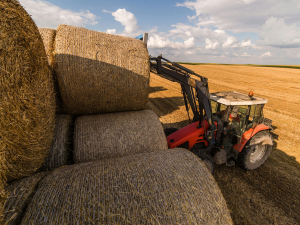Southland Farmer Murray Donald appointed chair of Safer Farms
Southland farmer Murray Donald has been appointed as chair of Safer Farms, the industry-led organisation focused on reducing harm, injuries and fatalities in the agricultural sector.
 Lindy Nelson, chair of Safer Farms and a Farm Without Harm ambassador, says the Safety Alerts are based on real-life documented incidents and provide key lessons for farmers.
Lindy Nelson, chair of Safer Farms and a Farm Without Harm ambassador, says the Safety Alerts are based on real-life documented incidents and provide key lessons for farmers.
A near miss experienced by a North Island farmer worker when their tractor ‘park’ gear failed, has been shared as the latest Safety Alert from Safer Farms.
The employee at the East Coast farm had to jump out of the way as the unmanned vehicle rolled towards him. It then continued to roll through the farm for 1.2km before it was finally halted by trees.
The Alert outlines how the farm staff member was feeding silage to stock and parked the tractor in a gateway, engaging it in ‘park’ gear as he went to open the gate. The park gear failed, and the worker had to jump out of the way to avoid being hit as the vehicle started rolling.
Potential causes for the incident included potential wear and tear on the park gear due to operators ‘throwing’ the tractor into ‘park’ rather than coming to a complete stop first.
A further factor could be not using back up methods, such as lowering the front forks/hydraulics to the ground before getting out of the cab.
While emergency brakes can also be engaged in conjunction with the Transmission Park Gate, this can cause issues as operators can drive off with the brake on and strain the brake function.
It is recommended that operators should only engage ‘park’ once the tractor has fully stopped. The park lock and park brake should both be applied when parked or operating from a static position.
They should also double check for movement or instability - even when the park gear / brake is engaged - before leaving the cab. A backup method should always be used, even if the ground seems relatively flat.
Safer Farms brings together farmers and senior leaders from across the agribusiness to lead and inspire the sector-wide Farm Without Harm strategy.
Lindy Nelson, chair of Safer Farms and a Farm Without Harm ambassador, says the Safety Alerts are based on real-life documented incidents and provide key lessons for farmers.
"Safety Alerts are about us sharing and learning from one another. It’s a new approach to reducing harm.
“We’re encouraging farmers to discuss the Safety Alerts with their teams and ask if these incidents could happen on their farm It’s also a good idea to look at what farmers have in place to prevent such an incident happening.”
The Alert also underlines the importance of managers providing thorough operator assessment and training.
This includes raising awareness about overloading, including checking the size and weight of loads, ensuring operators know how to counterbalance the tractor effectively and removing hunger boards from wagons.
To view the Safety Alerts, please visit www.farmwithoutharm.org.nz/safety-alerts. Alerts can be printed out for use in training and discussions and there is an option to be emailed when new Safety Alerts are added.
Fonterra’s impending exit from the Australian dairy industry is a major event but the story doesn’t change too much for farmers.
Expect greater collaboration between Massey University’s school of Agriculture and Environment and Ireland’s leading agriculture university, the University College of Dublin (UCD), in the future.
A partnership between Torere Macadamias Ltd and the Riddet Institute aims to unlock value from macadamia nuts while growing the next generation of Māori agribusiness researchers.
A new partnership between Dairy Women’s Network (DWN) and NZAgbiz aims to make evidence-based calf rearing practices accessible to all farm teams.
Despite some trying circumstances recently, the cherry season looks set to emerge on top of things.
Changed logos on shirts otherwise it will be business as usual when Fonterra’s consumer and related businesses are expected to change hands next month.

OPINION: Here w go: the election date is set for November 7 and the politicians are out of the gate…
OPINION: ECan data was released a few days ago showing Canterbury farmers have made “giant strides on environmental performance”.